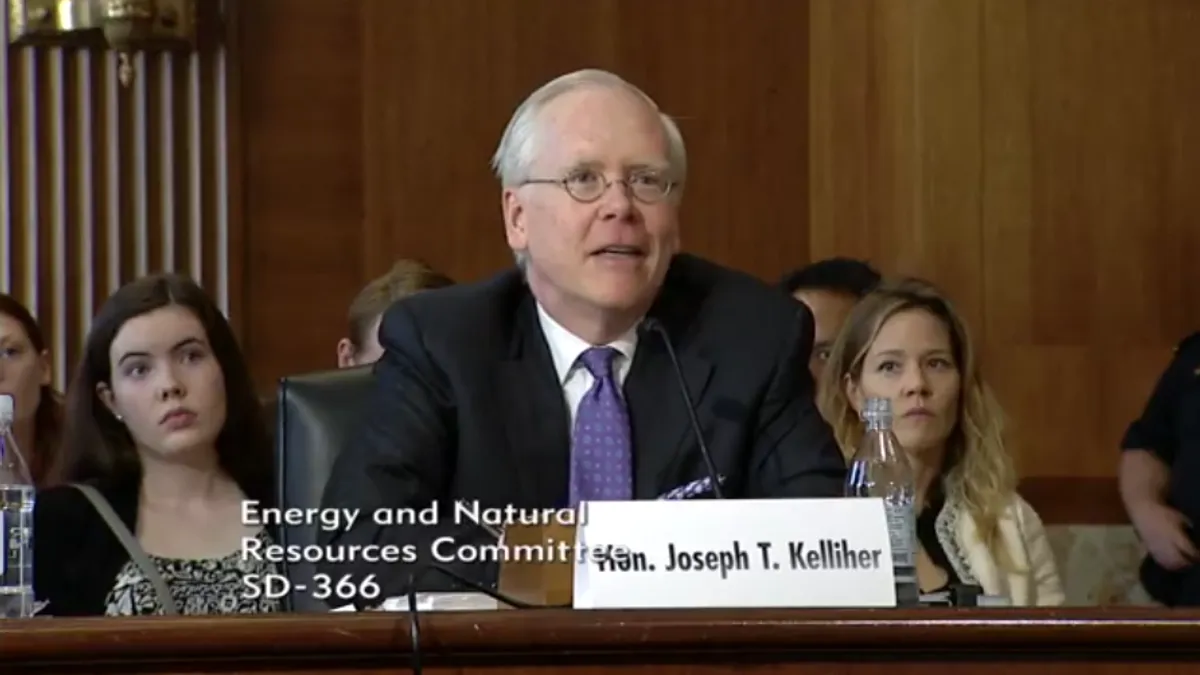Dive Brief:
-
A former chairman of the Federal Energy Regulatory Commission (FERC) who now works for one of the nation's largest utility companies questioned the need for new pipeline infrastructure in New England during a Senate committee hearing on Thursday.
-
Former Republican Chair Joe Kelliher, now executive vice president at NextEra Energy, said that New England's pipeline system is adequate for "all but 12 days of the year," and that the failure of projects like the Northeast Direct pipeline is due to insufficient market demand for new pipeline capacity.
-
Instead of new pipelines, Kelliher said a more economic solution to ensure power reliability is to build dual fuel generators that can keep diesel or fuel oil onsite, but noted that some New England states oppose them due to their carbon and other emissions.
Dive Insight:
Kelliher's comments at the Senate Energy and Natural Resources Committee on Thursday run against the conventional wisdom among pipeline builders that New England is in need of more gas transportation.
Gas infrastructure companies say that insufficient pipeline capacity makes it difficult and expensive for generators to get fuel during the coldest winter days, when gas is diverted for home heating. Opposition from state governments and local residents prevents pipeline companies from building new projects that could lower power costs for consumers and enhance reliability, they argue.
But Kelliher, whose company builds major pipelines in other U.S. regions, countered that take. Asked by Sen. Angus King, I-Maine, about the Northeast Direct and Access Northeast pipelines, which unsuccessfully sought taxpayer support for their construction, the former FERC chair said the reason those projects are not being built is because of insufficient market demand.
"The New England pipeline system is adequate for all but 12 days of the year," he said. "The reason they were proposing to flow [pipeline financing] through the ISO-NE tariff is there's not market support for a 12-day pipeline."
Curtis Moffat, vice president at Kinder Morgan, which sought to build Northeast Direct, backed up Kelliher's argument about his project.
"It was the lack of clear market support," he told the Senate committee, noting that Kinder Morgan only secured about half of the pipeline capacity contracts it needed to finance the project before the company abandoned it in 2016.
Rather than new pipeline capacity, Kelliher said that ISO-NE documents show that keeping dual fuel generators on the system can help the grid ride out periods of limited gas supply.
"I think their planning has shown that the correct economic solution is more dual fuel capacity to burn fuel oil," he said. "During those 12 days you're not buying the most expensive gas, you're burning fuel oil that you have on hand."
Kelliher's company has an interest in the dual fuel issue, as it owns merchant generators in New England that operate during those times of gas constraints, but the region's grid operator has also highlighted it as a solution.
ISO-NE has long warned of the risks of inadequate pipeline capacity, but in recent years has "expanded its focus to include other potential solutions," spokesperson Marcia Blomberg wrote in an email, "as the challenges of pipeline financing and siting have become more obvious."
ISO-NE's recent fuel security analysis highlights dual fuel capabilities — as well as imports from Canadian hydro facilities — as "one key to maintaining reliability," CEO Gordon Van Welie said on a February media call.
"However," he said, "building new energy infrastructure in New England is difficult, and emissions restrictions are tightening dual-fuel generators' ability to use oil."
How the ISO compensates these generators is likely to change in the near future. Earliear this month, FERC ordered the grid operator to alter its tariff to better value fuel security, including a mechanism for how generators with onsite fuel could be kept online in its forward capacity market. The grid operator has until early September to file its plan.














